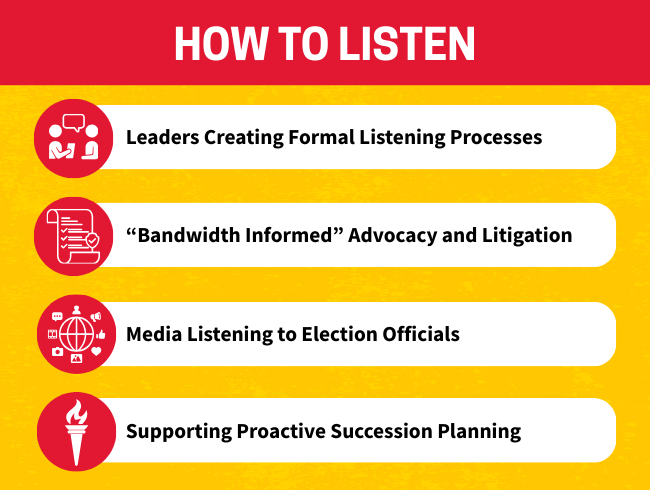Listen to elections professionals to decrease burnout
Our literature review shows cultivating a sense of agency at work can support elections professionals, decrease burnout, improve retention and succession, and strengthen election administration.
We can still reduce burnout among elections professionals under less than ideal conditions.
There are many things that make running elections hard. Most of them are unlikely to change soon. Federal and state funding for election administration is unlikely to increase dramatically. American politics is likely to remain polarized. Courts will continue to order changes to rules close to the start of voting or even while it is occurring. Distrust in elections and conspiracy theories are likely to remain substantial threats to democracy in the United States.
However, there are practices stakeholders throughout the elections community can engage in right now to address burnout among election professionals, improve retention and succession, and ultimately deliver better performance from election agencies. The central insight of our new literature review on burnout and retention in election administration is that ensuring staff feel agency at work is crucial. With agency, workers have a greater capacity to show up authentically as themselves and bring their full wisdom to their work. They can safely express frustration and set boundaries. They can practice acceptance to continue working effectively when faced with challenges beyond their control.
Listening to elections professionals cultivates agency. Cultivating agency decreases burnout.
Listening is key to cultivating agency. Listening helps employees feel more connected to their colleagues and organization. It allows them to see the role they play individually in supporting the broader work of administering elections and strengthening American democracy. And feeling heard can mitigate the emotional exhaustion associated with burnout and turnover.
Our new report dives into the literature to suggest research based interventions to address burnout and increase retention.
In this report, authored by Mara Suttman-Lea, Associate Professor of American Politics at Connecticut College, we primarily focus on interventions that can take place within the election office itself to promote effective listening and cultivate a sense of agency among staff and election officials. We also highlight the other arenas within the broader elections community where effective listening to elections professionals by actors outside election agencies, such as policy makers, advocacy groups, and the media is needed to support retention and succession in election administration.
1) Chief election officials and other agency leaders should create formal processes for listening to staff experiences and concerns.
Chief election officials can make choices to create a workplace culture where all election workers feel comfortable speaking up and taking ownership of delivering good results for voters. These practices include formal post election debriefs, staff surveys, anonymous surveys and strong performance reviews, among other options. These efforts can spill over into staff interactions with one another, ultimately cultivating a working environment built on mutual and reciprocal listening at all levels.
2) Policy makers, advocacy groups and philanthropy can do “bandwidth informed” advocacy and litigation.
Local election officials consistently report being demoralized by the burdens placed on them through the onslaught of policy coming at them from state legislators and the courts. One root cause of these problems is that legislators, advocacy groups and philanthropy develop policy proposals or litigation strategies intended to strengthen democracy without sufficiently thinking about their impact on the bandwidth of elections professionals. Advocacy strategies involving legislation and litigation are often particularly bandwidth and resource intensive ways to achieve certain outcomes for voters. In many cases, the goals might be more efficiently achieved via direct engagement with elections professionals. By listening to elections professionals earlier in the policy development process, advocacy groups can both design better policies and avoid contributing to a sense of alienation among the elections professionals who will eventually bear the burden of implementing the policies proposed by advocacy groups.
3) Media should listen to election officials in terms of how to best communicate key election-related information to the public.
4) All of us can support proactive succession planning!
Sometimes the right thing for both an election office and a burned out elections professional is for that person to retire or move onto another opportunity. We serve neither voters nor elections professionals well when a lack of succession planning traps agencies and elections professionals in a situation that is no longer a good fit. Everyone in the elections space has a role to play in creating conditions where professionals can move on from roles with dignity and pride (i.e., retirement parties! lifetime achievement awards! etc.) and where new leadership is always being cultivated.
There are many things that are difficult to change about elections. But we can all listen. And it turns out that the research shows this can make a huge difference.
Read the full report to learn more about what the research says about how to use listening to decrease burnout, increase retention, and improve performance in election administration.
Sam Novey is Chief Strategist at the University of Maryland Center for Democracy and Civic Engagement. Funding for this report was provided in part by Democracy Fund.





